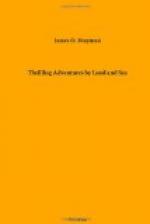Such was the state of things on Monday morning, when, at four o’clock, an astounding noise was heard, which re-echoed throughout the Whole extent of the mine. A general panic seized on every one; it was thought that the waters had forced a new issue. A rapid and confused flight took place; but, luckily, their fears were soon allayed on perceiving that it was only an immense mass of rock, detached from the mine, which had fallen into a draining-well. This false alarm, however, operated in a discouraging manner, on the minds of the workmen; and it required some management to bring them back to their respective stations, and to revive that ardor and constancy, which they had hitherto so nobly displayed.
They had scarcely renewed their endeavors to bore through the rock, when suddenly one of them felt the instrument drawn from his hands, by the poor imprisoned miners. It was, indeed, to them, the instrument of deliverance from their cruel situation. Singular to relate, their first request was neither for food nor drink, but for light, as if they were more eager to make use of their eyes, than to satisfy the pressing wants of appetite! It was now ascertained that eight of the sufferers still survived; and this time an authentic account of the happy discovery was dispatched to St. Etienne, where it excited the most enthusiastic demonstrations of sympathy and gladness. But there is no pleasure unmixed with alloy; no general happiness unaccompanied by particular exceptions. Among the workmen, was the father of one of the men who had disappeared in the mine. His paternal feelings seemed to have endowed him with superhuman strength. Night and day he never quitted his work but for a few minutes to return to it with redoubled ardor; one sole, absorbing thought occupied his whole soul; the idea that his son, his only son, was with those who were heard from within. In vain he was solicited to retire; in vain they strove to force him from labors too fatiguing for his age. “My son is among them,” said he, “I hear him; nothing shall prevent my hastening his release;” and, from time to time, he called on his son, in accents that tore the hearts of the bystanders. It was from his hand that the instrument had been drawn. His first question was “my child?” Like Apelles, let me throw a vail over a father’s grief. His Antoine was no more, he had been drowned.
For four days several medical men were constantly on the spot, to contribute all the succors that humanity, skill, and science could afford. It was they who introduced through the hole, broth and soup, by means of long, tin tubes, which had been carefully prepared beforehand. The poor captives distributed it with the most scrupulous attention, first to the oldest and weakest of their companions; for, notwithstanding their dreadful situation, the spirit of concord and charity had never ceased for a single moment to preside among them. The man who was appointed by the




